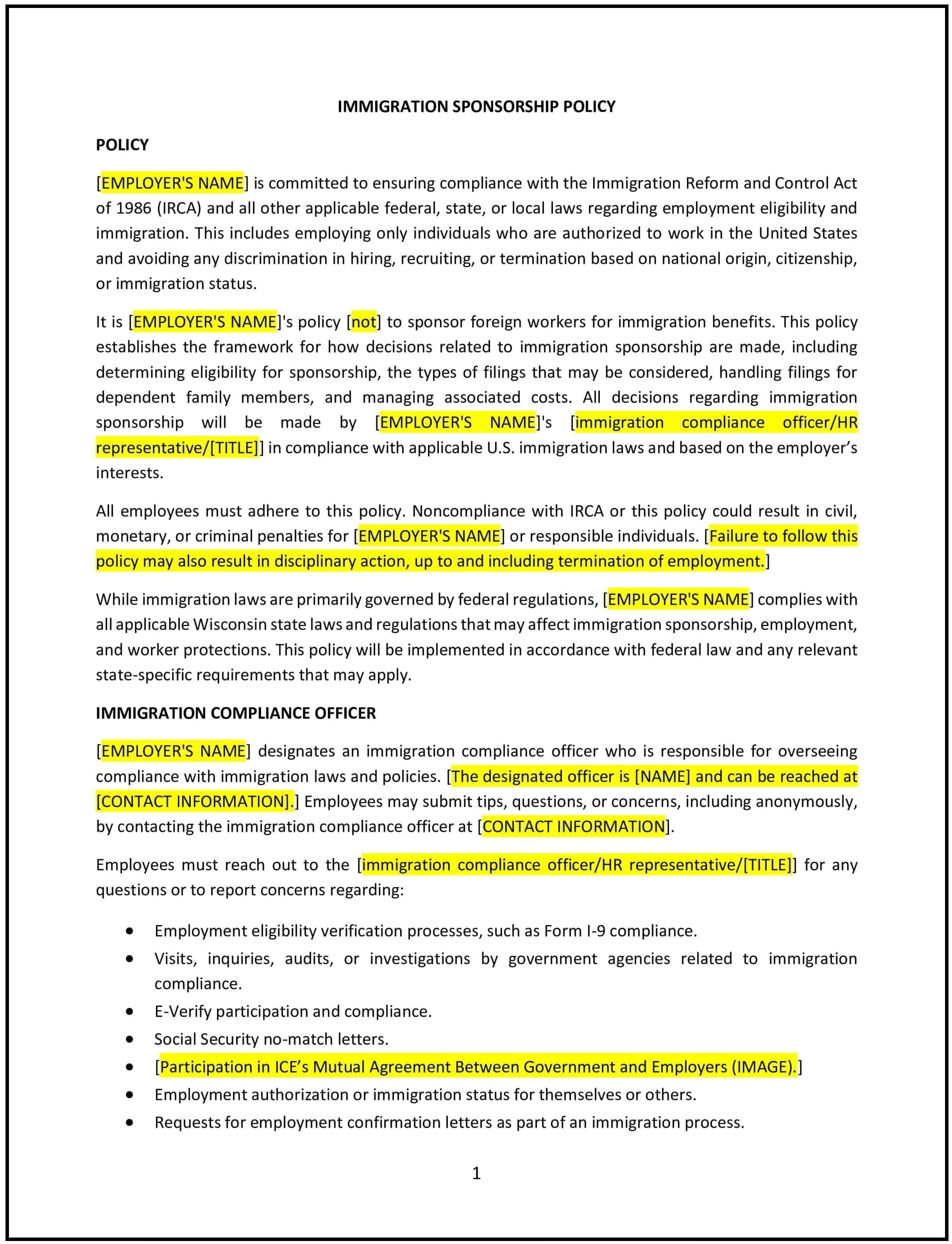Immigration sponsorship policy (Wisconsin): Free template
Got contracts to review? While you're here for policies, let Cobrief make contract review effortless—start your free review now.

Customize this template for free
Immigration sponsorship policy (Wisconsin)
An immigration sponsorship policy helps Wisconsin businesses manage the process of sponsoring foreign employees for work visas and other immigration-related matters. This policy outlines the company’s procedures for supporting visa applications, supporting compliance with federal and state immigration laws, and addressing the responsibilities and obligations of both the business and the employee during the sponsorship process.
By implementing this policy, businesses can attract and retain international talent while ensuring that they meet legal requirements and maintain ethical practices in hiring and employment.
How to use this immigration sponsorship policy (Wisconsin)
- Define eligibility for sponsorship: Specify the types of positions or roles that may be eligible for immigration sponsorship. This may include highly specialized roles, those requiring specific expertise, or positions that are difficult to fill locally.
- Outline sponsorship process: Clearly describe the steps involved in the sponsorship process, including how employees or candidates can request sponsorship, the documentation required, and the timeline for submitting applications.
- Specify types of visas covered: Identify the types of visas the company is willing to sponsor, such as H-1B, L-1, or O-1 visas, and the conditions under which sponsorship will be considered.
- Provide criteria for sponsorship approval: Outline the company’s criteria for approving sponsorship requests, including whether the employee meets the qualifications for the visa, the company’s need for the employee's skills, and the business’s ability to support the sponsorship financially and administratively.
- Address employee responsibilities: Explain the responsibilities of the employee requesting sponsorship, including providing necessary documentation, maintaining legal status during employment, and following all rules and regulations related to their visa.
- Manage legal compliance: Ensure that the sponsorship process aligns with federal immigration laws and Wisconsin state regulations. Include guidelines on how the company will monitor and ensure that sponsored employees remain compliant with visa requirements.
- Set expectations for duration of sponsorship: Clarify the duration of the company’s sponsorship commitment, including any renewal procedures, timelines, and the possibility of extending the visa or transitioning to permanent residency (e.g., Green Card sponsorship).
- Address costs and reimbursement: Specify whether the company will cover all costs related to visa sponsorship, including filing fees, legal fees, and other expenses, or if the employee will be required to share in some of the costs.
- Explain consequences for non-compliance: Outline the steps the company will take if the employee violates visa conditions, including how this could impact their employment status and sponsorship.
- Review and update regularly: Periodically review the immigration sponsorship policy to ensure it reflects changes in immigration laws, business needs, and the company’s approach to talent acquisition.
Benefits of using this immigration sponsorship policy (Wisconsin)
This policy offers several benefits for Wisconsin businesses:
- Attracts global talent: By providing a clear and structured sponsorship process, the policy allows businesses to attract top international candidates who may have specialized skills that are hard to find locally.
- Supports legal compliance: The policy helps the company navigate the complex immigration process while supporting compliance with state and federal immigration laws, reducing the risk of penalties or legal issues.
- Improves employee retention: By supporting employees through the sponsorship process, businesses can increase employee loyalty and retention, particularly for foreign employees who may feel more secure in their position.
- Enhances company diversity: Immigration sponsorship policies contribute to a diverse workforce by bringing in talent from different cultural backgrounds and perspectives, which can foster innovation and creativity.
- Strengthens company reputation: A commitment to sponsoring international talent can enhance the company’s reputation as an inclusive employer and an advocate for diversity and global collaboration.
- Facilitates business expansion: By sponsoring international employees, businesses can expand their reach and expertise, particularly in industries that require specific foreign skills or knowledge.
Tips for using this immigration sponsorship policy (Wisconsin)
- Communicate the policy clearly: Ensure that all employees are aware of the company’s immigration sponsorship policy, especially those in roles that may require sponsorship. Provide regular updates on the status of the policy and any changes in immigration law.
- Provide support throughout the process: Offer guidance and resources to employees requesting sponsorship, including assistance with documentation, legal consultations, and advice on maintaining legal status during their employment.
- Coordinate with legal experts: Work closely with immigration attorneys or legal experts to ensure that the sponsorship process is handled correctly and efficiently, minimizing errors and delays.
- Monitor visa compliance: Regularly track the status of employees on work visas to ensure they are compliant with immigration laws and that their visas are renewed on time.
- Set realistic expectations: Clearly communicate the process, timelines, and potential challenges to employees who request sponsorship. Be transparent about the likelihood of approval and any risks associated with visa sponsorship.